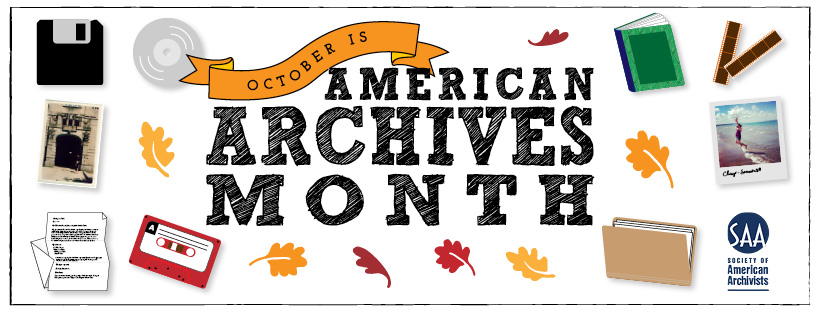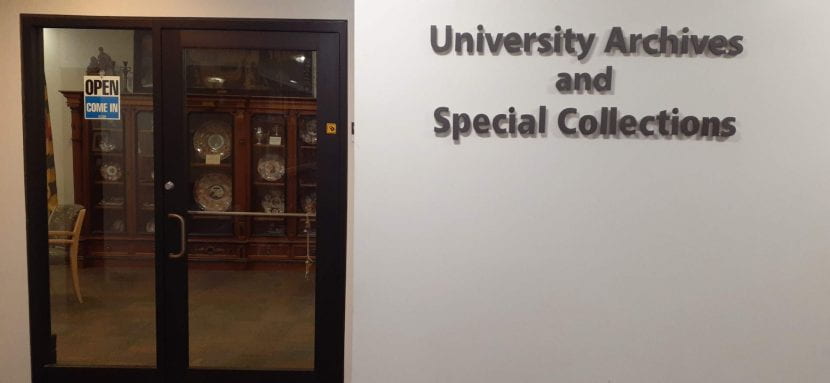
In the twelve years I’ve worked in Towson University’s Special Collections and University Archives (SCUA), I am certain the four words I’ve heard most often are “What is this place?”
What This Place Is
University Archives
I typically begin my spiel about we hold with the words “We hold the history of Towson University, beginning with the founding of the school in 1866.”
Our department was officially created in 1970, but the material we hold was being gathered by campus administrators well before that time.
Dorothy Reeder, head librarian from 1948 until 1970 and then college archivist, wrote in her annual reports about special collections material being kept in the president’s office and the creation of the first Towson Room to hold those materials in the original Albert S. Cook Library, which is currently the Media Center.
When she was tasked with creating an archives for the school, Reeder put the call out to alumni and faculty, asking them to donate their records to the archives.
Her successor, Herb Andrews, was a history faculty member as well as college and then university archivist. He worked to create a records retention schedule for every academic department. The intention was to outline what each department was to send to the archives, satisfying the state requirement that mandates the school keep certain records.

Between the work done by Reeder and Andrews, our early records are robust, however, we must acknowledge that often college and university archives, including ours, focus heavily on administration records which means that many other voices have previously not been recognized as vital to understanding the full history of Towson University. Carnegie Mellon has recently addressed this dilemma in a virtual exhibit, and it can be applied to many other institutions.
Nadia Nasr, the first trained archivist hired by the university, began trying to find ways to capture those other points of view in collaboration with Residency Librarian, Sarah Espinosa, in 2014. Working with the Student Organizations office, they created a program that encouraged student organizations to donate records to the archives. In the years since the program began, about 30 organizations per year have donated their constitutions, officer lists, and other material that will help future researchers know what campus was like for these groups and students.
The current head of the department, Assistant University Librarian for Special Collections and University Archives Dr. Ashley Todd-Diaz, joined SCUA in 2016. In the five-plus years of her tenure, she has worked with faculty members to create learning labs for students, with lessons on tracing various aspects of the history of TU such as the development of campus itself or the creation of the Black Student Union. Other topics include investigating rare books from the Baltimore Hebrew Institute Special Collections and how to look at historical objects to gain clues about their origins and purpose.
Special Collections
The Baltimore Hebrew Institute collection is, really, a special collection. We care for the items in the collection because they were part of the holdings that transferred here when Baltimore Hebrew University was folded into Towson University in 2009. However, they themselves are not part of the day-to-day administration of TU. Items like this are considered special collections items, even when they involve faculty who teach here or former students.
One of my favorite collections is the Towson and WWII collection, but while it was created by students, faculty, and alumni of the school, it wasn’t part of the standard administration of the school, so it is considered a special collection.
Working with collections
SCUA also provides an opportunity for students to delve more deeply into the work done by archivists as well as the history of the campus. We are fortunate to have had a number of interns over the years who have worked with both our university records and special collections. We also employ students to help us make items available for researchers by assisting with digitization efforts. And we have worked with high school students to show them the possibilities of working in the field.
Since 2019, SCUA has collaborated with the Department of History and the Office of Inclusion and Institutional Equity on the Unearthing Towson’s History Project. Faculty and students do deep dives into the history of the school to “[i]nvestigate the history of intersectional diversity including not only race and male/ female gender but sexuality, complex gender, class, and ethnicity”. Their work has culminated in enhanced resource lists and blog posts and soon the current team will begin working on oral history projects.
For anyone who wants to use the collections held by SCUA, sometimes it’s just nice to know how to find things. To that end, we have developed a research guide to help you find things using our website, including a page describing some standard language and useful resources beyond the website.
Thanks for celebrating American Archives month with us!
